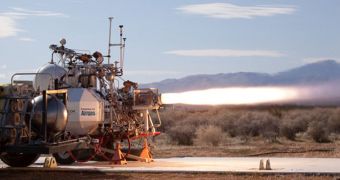A private partnership of companies in the United States has just tested a new type of rocket nozzle technology, that could contribute to making launches and steering maneuvers a lot safer.
The successful hot-fire demonstration took place on March 22, as engineers from Mojave, California-based XCOR Aerospace and Centennial, Colorado-based United Launch Alliance (ULA) tested their new vacuum nozzles.
These new devices can be produced at lower costs than conventional nozzles used today. They are also lighter and easier to manufacture, and are destined for use on liquid-fueled rocket engines.
Officials from the two companies say that their new creation could easily replace the nozzles commonly used at this time in large, upper-stage rocket engine systems. Doing so would cut costs, but also reduce weight by a few hundred pounds.
The weight loss is due to the fact that the new nozzles are made out of aluminum alloys. Which are lighter than standard materials, and also enable constructors to use different manufacturing techniques.
Originally, the advanced nozzle was produced during the Lynx program at XCOR. The goal of this endeavor is to create a reusable, suborbital vehicle, that could be used for space tourism and scientific flights in Earth's upper atmosphere and beyond.
The company hooked up with ULA in 2010, and started a joint risk-reduction program that saw the United Launch Alliance – a joint venture of Lockheed Martin and Boeing – facilitating the development of a prototype for the new nozzle technology.
This cooperation also led to the successful testing of a new cryogenic piston-pump technology, that was also developed for the Lynx. These pumps insert liquid hydrogen (LH2) in rocket engines.
Following these groundbreaking successes, the two companies decided to extend their collaboration even further. At this point, they are involved in developing a liquid oxygen (LOX)/LH2 engine.
“ULA understands that we have to offer competitive prices to our government and commercial customers along with the outstanding and unmatched reliability they expect from us,” explained Dr. George Sowers, quoted by Space Fellowship.
“By working with XCOR, we see the potential to develop engines that offer the performance and reliability our customers need at a more affordable price,” he adds. Sowers is the vice president of business development and advanced programs at ULA.
“This announcement validates XCOR’s business mantra of ‘stay focused on propulsion, Lynx and the customer’ and ULA is a great customer,” adds the XCOR Chief Operating Officer, Andrew Nelson.
“And when you have innovative, safe, low-cost and fully reusable technologies that fly multiple times a day, those technologies will find other buyers, such as ULA,” he adds.
“Whether it is non-toxic thrusters, fully reusable main-engine propulsion, cryogenic flight-weight piston pumps, or non-flammable cryogenically compatible composite tanks and structures – the future looks bright for XCOR,” he concludes.

 14 DAY TRIAL //
14 DAY TRIAL //